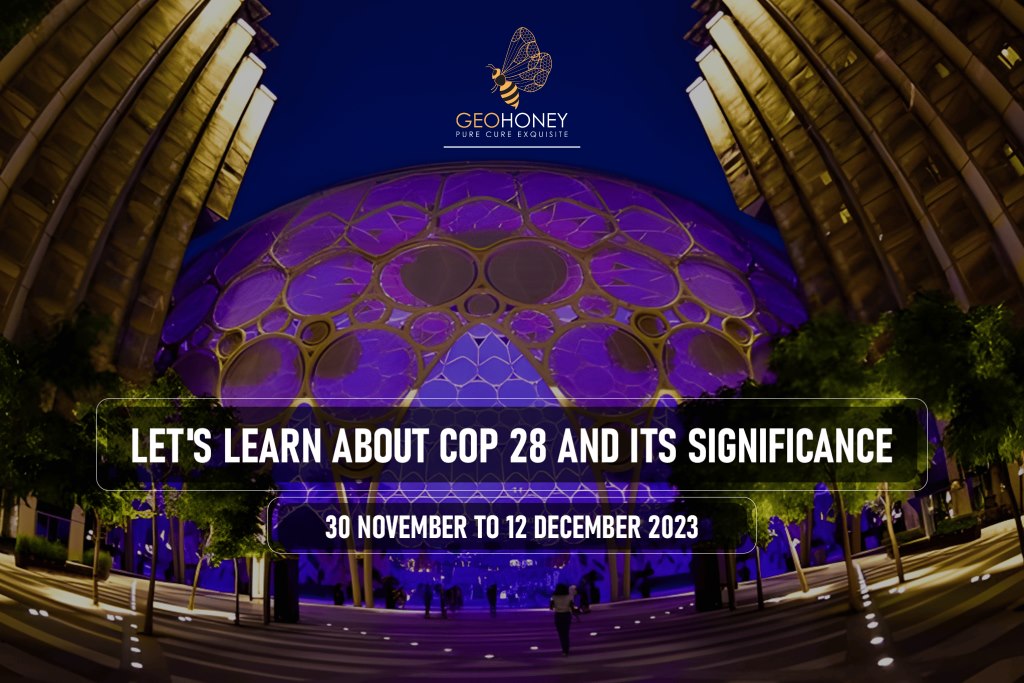- Tokyo: 12:04
- Singapore: 11:04
- Dubai: 07:04
- London: 03:04
- New York: 22:04
Let's Learn About COP 28 and its Significance

COP 28 refers to the United Nations Climate Change Conference taking place in Dubai, United Arab Emirates, from 30 November until 12 December 2023.
Every year, the United Nations Climate Change Conferences (or COPs) are held. They are the world's only multilateral decision-making platform on climate change, with nearly every country in the world represented.
Simply said, the COP is where the world gets together to agree on methods to address the climate catastrophe, such as limiting global temperature rise to 1.5 degrees Celsius, assisting vulnerable populations in adapting to climate change effects, and attaining net-zero emissions by 2050.
More than 70,000 delegates, including members of the UN Framework Convention on Climate Change (UNFCCC), are anticipated to attend COP28. Participants include business leaders, young people, climate scientists, indigenous peoples, journalists, and a variety of other specialists and stakeholders.
Why is COP 28 Important?
Having discussed and agreed on the most significant provisions of the Paris Climate Change Agreement over the last few years, COP 28 is all about implementing the Agreement and increasing ambition and action.
What will be discussed at COP 28?
Discussions at COP 28 must advance in several workstreams, including hammering out the details of a loss and damage finance facility to assist vulnerable communities dealing with immediate climate impacts; driving towards a global goal on finance that would help fund developing countries' efforts to address climate change; accelerating both an energy and a just transition; and closing the massive emissions gap, to name a few.
COP 28 must be a "can-do COP" in which countries demonstrate how these tools will be put to use in the critical next two years in order to accelerate the pace.
Which meetings are taking place during COP 28?
The conference includes the yearly meetings of the Convention's three decision-making bodies, the Paris Agreement, and the Kyoto Protocol. Delegates from all member countries meet in these bodies to discuss and vote on a wide range of climate-related agenda issues.
Meetings at the 2023 UN Climate Change conference in Dubai include the 28th session of the Conference of the Parties (COP 28), the Convention's supreme decision-making body, as well as the fifth session of the Paris Agreement's decision-making body (CMA 5) and the 18th session of the Kyoto Protocol's decision-making body (CMP 18), which will discuss workstreams under the Paris Agreement and the Kyoto Protocol, respectively.
Furthermore, the UNFCCC's two subsidiary bodies, the Subsidiary Body for Implementation (SBI) and the Subsidiary Body for Scientific and Technological Advice (SBSTA), will meet for SBI 59 and SBSTA 59, respectively. These two organisations do not make decisions, but rather provide technical information and advice to the COP, CMA, and CMP.
What is the difference between the Green Zone and the Blue Zone at COP 28?
Blue Zone: All official sessions, meetings, side activities, and press conferences are taking place in the "blue zone," the UN Climate Change-managed formal conference and negotiation location. Only party delegations, heads of state, admitted observers, and accredited journalists are permitted to access the blue zone.
Green Zone: COP 28 provides a platform for the global community and civil society to demonstrate solutions and approaches beyond the official UN-organized portion of the summit. The "green zone," which is managed by the UAE, is a space for youth representatives, artists, businesses, regional and local decision-makers, and many other civil society actors to discuss, present, and exchange ideas and solutions for a net-zero future in a more informal setting, such as presentations, podium discussions, poster sessions, and exhibitions.
Who can attend COP 28?
Approximately 70,000 people are anticipated to attend COP28 in Dubai.
Access to the blue zone and participation in COP28 is restricted to delegates, admitted observer organisations, and accredited members of the press and media. The summit will be attended by delegates from all 199 UN Framework Convention on Climate Change Parties.
While the public will not be able to attend the conference in person, several activities in the blue zone, such as the plenary sessions of the bodies, the high-level segment with heads of state, numerous press conferences, and side events, will be webcast live on unfccc.int. COP TV gives the public another way to follow the conference and see interesting interviews and themed pieces.
While entry to the blue zone is strictly controlled, the green zone, which is managed by the host country of COP 28, is more generally available.
Who is hosting COP 28?
The United Arab Emirates is the host country and holds the presidency of COP28.
Every COP is rotated among the five United Nations regional groups: the African Group, the Asia-Pacific Group, the Eastern Europe Group, the Latin American and Caribbean Group (GRULAC), and the Western European and Others Group (WEOG). The host government's responsibility is to provide the COP with the necessary buildings and facilities, as well as equipment, utilities, and services. The host government's duty as presidency includes engaging other governments at the ministerial, head-of-delegation, and technical levels to collaborate in order to ensure a successful COP 28.
Dr. Sultan Ahmed Al Jaber, Minister of Industry and Advanced Technology and Special Envoy for Climate Change for the United Arab Emirates, has been named COP28 President.
To Learn More About: COP28



